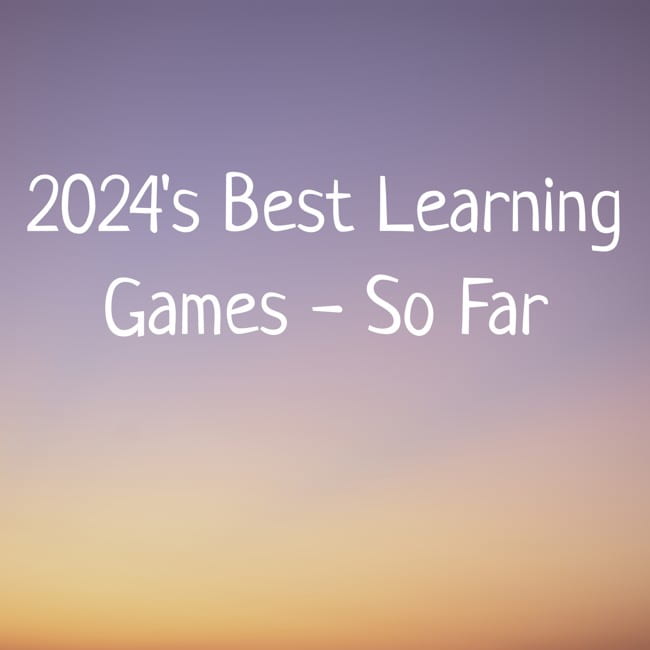It continues to be time for mid-year “Best” lists.
You can see all my previous Online Learning Games “Best” lists (and there are a lot since I’ve doing this since 2007) here. Note that they’re also continually revised and updated.
Here are my picks from the first part of 2024:
In the LanguageGuessr game, you listen to a sample of a language and then have to guess where it’s primarily spoken. I’ve previously posted about a different game that has some similarities to this one: Guess What Language Is Being Spoken In “Ling Your Language” Game. I’m adding this info to The Best “Language Maps”
You can create your own “Connections” game at Create A Puzzle. I’m adding it to NY TIMES UNVEILS “CONNECTIONS,” AN ONLINE GAME THAT’S GREAT FOR ELLS.
You don’t know Africa is a useful, and free, geography game. I’m adding it to The Best Online Geography Games.
Giant Steps is another online learning game site in the rough style of Kahoot/Quizizz. Teachers choose a game, share a code with students, who then use the code to register to play the game. It does have anywhere near the number of games in its shared library that other gaming platforms have, but it does seem easy enough to create them. The games have a longer time duration, and the site seems more suited to lengthier questions. I’m adding this info to: The Best Websites For Creating Online Learning Games and to The Best Online Games Students Can Play In Private Virtual “Rooms.”
Gartic Phone and FishBowl are two online games that would be fun and useful for ELLs to play – if they aren’t blocked by district content filters. I’m adding them to The Best Online Games Students Can Play In Private Virtual “Rooms”
Neighborle is game where you have to name the countries that border specific nations. I’m adding it to The Best Online Geography Games.
Travle is an online Geography game where you have to figure out how to get from one country to another one. You can read more about it at Google Maps Mania. I’m adding it to The Best Online Geography Games.
The New York Times has been on a roll creating online games with potential education uses. One is “Connections” – see NY TIMES UNVEILS “CONNECTIONS,” AN ONLINE GAME THAT’S GREAT FOR ELLS. The other is “Flashback” – see NY TIMES UNVEILS GAME WHERE PLAYERS HAVE TO PUT HISTORICAL EVENTS IN CHRONOLOGICAL ORDER. Now, they are testing out a new game called Strands. Strands is basically a Word Search with a few small, but intriguing, twists. Here’s how an article from Atlantic describes those changes:
The player must guess the words to find in each scramble based on a cryptic theme, and the scrambled words, which can bend in any direction, are arranged to use up the entire letter grid.
Having a theme to a word search doesn’t seem like that big of an innovation to me, but having all the words in the grid involved in making up words (though not all are relate to the them – finding a non-related one results in you getting a hint) seems like its main unique contribution to the genre. Unlike the first two games I mentioned in this post, Strands seems likely to be too challenging to most English Language Learners (it was certainly challenging to me!). However, just as the Times borrowed their ideas for the Connections and Flashback from education sites and made more difficult versions, I’d bet dollars-to-donuts that soon there will be other online sites borrowing some ideas from Strands and making versions that are much more accessible, including letting teachers create their own. I’m adding this info to THE BEST SITES FOR CREATING NOT TOTALLY USELESS WORD SEARCHES.
Mission US has many free online historical simulations for teachers and students, with a high-production quality. I really liked using their one on the American Revolution when I was teaching U.S. History, but then they really went in the wrong direction in their simulations about the underground railroad and another on Native Americans (see MISSION US UNVEILS NEW IMMIGRATION GAME – IS IT A WINNER OR A LOSER?). Since my last post, they’ve unveiled new ones on Japanese-American Internment (Imprisonment) and on the Civil Rights Movement, and they have an upcoming one on indigenous Americans.I haven’t yet checked these out, but I have to assume (hope) they they learned their lesson from all the critical feedback they received from their earlier games. Let me know what you think if you’ve used them. I’m adding this info to The Best Online Learning Simulation Games & Interactives — Help Me Find More, where you can also find many additional resources about how careful we need to be when using historical simulations in the classroom.
20 Words/20 Seconds could be a fun game to play.
Backdrop hosts a number of free, and cool, geography games, including ones that show you paintings and you have to identify on a map what location is depicted in them. Its sister site, TripGeo, also hosts some more straightforward geography games. I’m adding them to The Best Online Geography Games.
LinkedIn just launched three online games. One of them is called Pinpoint, where words are unveiled one-by-one, and you have an opportunity to guess which category they all belong to after each clue. LinkedIn version will likely be too difficult for many English Language Learners. However, the game concept itself is a good one, and can easily be simplified by any ELL teacher in their classroom. I’m adding this info to The Best Ideas For Using Games In The ESL/EFL/ELL Classroom.
Dict is an AI-powered dictionary game.




Recent Comments